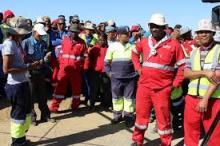In the face of multiple crises of profit-driven socio-economic systems that have driven millions of people in Africa into hopeless poverty, the urgent questions of our time are quite clear: How do we change the balance of class forces in favour of the working class? What are the radical reforms around which a program of mass action could be initiated? How do we form mass workers’ parties all over the continent? What about organisations of the jobless, the landless and the homeless, the femini...read more
In the face of multiple crises of profit-driven socio-economic systems that have driven millions of people in Africa into hopeless poverty, the urgent questions of our time are quite clear: How do we change the balance of class forces in favour of the working class? What are the radical reforms around which a program of mass action could be initiated? How do we form mass workers’ parties all over the continent? What about organisations of the jobless, the landless and the homeless, the feminist structures, the youth?






































